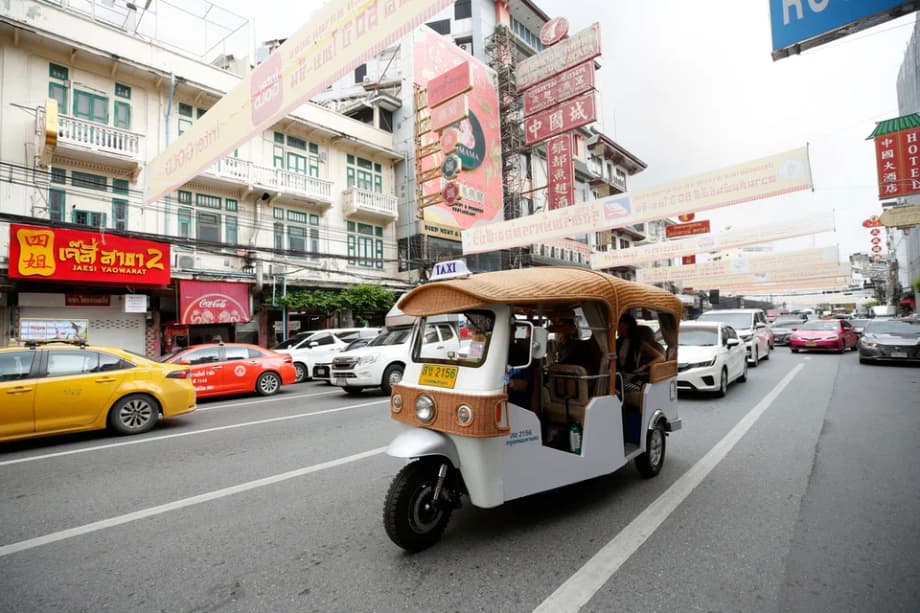Kidnappings tied to scams put Thai travel under scrutiny
As of September 2025, South Korea’s Ministry of Foreign Affairs has logged 11 cases of South Koreans kidnapped in Thailand. The figure marks a clear rise compared with recent years and has stirred concern among travelers and families at home. Thailand remains a favorite destination for South Koreans, and tens of thousands arrive every week for holidays and business. The rise in abductions underscores how criminal networks, many connected to online fraud and call center operations, now intersect with mainstream tourism and migrant work routes.
- Kidnappings tied to scams put Thai travel under scrutiny
- What the numbers show
- How kidnappings unfold
- Cases that shocked the public
- Why Thailand is now a focal point
- Law enforcement and diplomacy
- Safety advice for travelers and job seekers
- Victims can also face legal risk
- Regional comparisons add context
- Highlights
The ministry’s data, submitted to lawmaker Kim Geon of the main opposition People Power Party, shows a steady upward trend from zero reported cases in 2021 to one in 2022 and five in both 2023 and 2024. While the chance of any one traveler facing kidnap is still low, the cases that do occur are increasingly linked to organized groups that use deception, coercion, and cross border movement to recruit or trap victims. That pattern mirrors broader shifts across Southeast Asia as cyber scam syndicates relocate and rebuild operations after enforcement pressure.
What the numbers show
Thailand’s case count sits against a wider regional picture. About 1.86 million South Koreans visited Thailand in 2024, according to Thai media. The vast majority faced no violent crime. Yet kidnapping complaints and criminal incidents involving Korean victims or perpetrators have risen alongside the growth of transnational scam activity. Several noted cases, including the killing of a 34 year old Korean tourist in Thailand in 2024 by compatriots later arrested across three countries, amplified public alarm.
Neighboring Cambodia has faced a surge of cases this year. Government figures cited in local reports show 252 South Koreans kidnapped and detained there from early 2025 through July, up from 17 in 2023 and 220 in 2024. In the first eight months of this year, there were reports of 330 South Koreans detained in Cambodia, with most cases resolved. Officials and rights groups say online scam sites across the Mekong region are linked to forced labor and human trafficking, often drawing in foreign workers with misleading job offers and then holding them under threat.
How kidnappings unfold
Investigations in Thailand point to three recurring patterns. Some victims are abducted outright for ransom. Others are kidnapped after responding to job offers that turn out to be fronts for scam operations. A third group is coerced by compatriots already embedded in criminal rings, then pressed into illegal work under constant monitoring. Each scenario can involve movement across borders, the seizure of passports, and threats or violence, making escape difficult without outside help.
Lures and deception
Recruiters for scam networks often target young South Koreans, typically in their twenties or thirties, who are fluent in the language and comfortable with messaging apps and phone outreach. Interviews with insiders show that syndicates market eye catching weekly pay, sometimes quoting sums between 10 million and 15 million won, and claim to offer structured roles inside what looks like a normal office. Operations are described as tiered workplaces. Entry level staff search for targets, intermediates develop trust and steer victims toward fake investments, and senior members handle financial flows and money laundering.
Groups that have relocated to Thailand vet applicants closely. According to investigative reports, some networks reject anyone who has recently visited Myanmar, Laos, or Cambodia, believing those trips could draw extra scrutiny from Thai authorities. The same reporting describes strict internal rules, including bans on weekday drinking and drug use to reduce police attention. Applicants are asked to submit passport copies, a health record, and a criminal background report. This personal data, once collected, can be used to exert additional pressure if recruits later try to flee or report the crimes.
Once trapped
Victims forced into scam centers describe confiscated phones and passports, constant surveillance, and threats of violence or debt if they refuse quotas. Police raids in Thailand have found whiteboards marked with Korean language pitches tied to fake investments, romance scams, and other schemes. In one June operation in Chon Buri’s Bang Lamung district, officers recovered equipment laid out for a call center and rescued a South Korean man who had been reported kidnapped and compelled to work. He was found alive and later placed in contact with the embassy. Investigators said seized items would be examined to determine their use in criminal activity.
Rules inside these groups are rigid. Members are told not to exchange personal information and to keep a low profile. Those who resist face threats, including beatings, while others are told they owe large sums for housing and training costs. The combination of isolation, surveillance, and fear keeps many compliant until a police raid or outside intervention creates a chance to escape.
Cases that shocked the public
Two developments made headlines and helped map how these networks operate. In 2024, a 34 year old South Korean tourist was kidnapped and killed in Thailand. Three suspects, all South Korean, were captured in South Korea, Vietnam, and Cambodia. The case showed how criminals move across borders to evade local police and highlighted the need for better coordination among Southeast Asian law enforcement and Korean authorities.
In June 2025, Thai police raided a luxury pool villa in Chon Buri after a tipoff from the South Korean embassy. Officers arrested 21 suspects, including 20 South Koreans and one Chinese national, and rescued a Korean man who had been allegedly kidnapped and forced to work for a call center scam ring. The scene fit a pattern seen across the region: a sealed workspace, rows of computers, and prewritten scripts for fake investment pitches. Several suspects tried to flee, and one was injured after jumping from a second floor. Police handed the group over to investigators, and officials notified the victim’s family that he was safe.
Follow up actions continued through the summer and early fall. In September, Thai authorities completed the extradition of a group of South Korean suspects arrested in Chon Buri to face charges at home. That transfer capped a series of raids in which police seized laptops, desktop computers, and mobile phones and revoked the suspects’ visas. The operations were coordinated with officers from the South Korean embassy and Thai immigration, showing deeper cooperation that is likely to be repeated as new cells are found.
Events in Cambodia sharpened the sense of risk among Korean families. The body of 22 year old student Park Min ho was found in Kampot province in August. Cambodian authorities said he died of cardiac arrest after being tortured and beaten by a criminal gang that demanded a ransom. South Korea imposed a travel ban for several locations in Cambodia, including Bokor Mountain, Bavet, and Poipet. The case triggered direct talks between Seoul and Phnom Penh on repatriation and protection for citizens trapped inside scam compounds.
Why Thailand is now a focal point
Crackdowns in Cambodia have pushed several scam groups to look for new bases. Interviews with middle managers inside these networks indicate that parts of Thailand have become hubs for operations that previously ran out of Cambodian cities. Thailand’s infrastructure, large housing stock in resort areas, and international flight links make it attractive to criminals who value anonymity and quick exit routes. Large tourist arrivals also help scammers blend in, rent properties, and move money and equipment with less attention.
Thai authorities have tightened immigration checks and increased patrols in known hotspots. Criminals have adapted in response. Recruiters have imposed their own screening to avoid drawing attention, and they switch locations rapidly when rumors of police interest spread. The result is a moving target for law enforcement, with compounds that pop up in one province, go quiet, and then reappear somewhere else.
Law enforcement and diplomacy
Despite the challenge, cross border coordination is improving. The Chon Buri raids drew on embassy tipoffs, and Thai tourist police worked with immigration and local units to conduct searches and seize devices. Extraditions of suspects show how cases now flow across jurisdictions so that prosecutions can proceed in the most feasible venue. South Korean investigators are also engaging counterparts in Cambodia after a string of high profile rescues and arrests in Phnom Penh and other cities.
Rep. Kim Geon, a member of the main opposition People Power Party, has pressed Seoul to expand its diplomatic and policing toolkit, with a sharper focus on recruitment pipelines that begin on social media and message boards. He said the state must work with governments across Southeast Asia and clamp down on deceptive job ads that funnel recruits into criminal groups.
“The government must establish a system for cooperation with not only Cambodia but Thailand and other major countries in Southeast Asia to protect our people,” Kim said. He added that authorities should step up monitoring of illegal hiring notices that lure victims to the region.
Officials estimate that about 200,000 people, including around 1,000 South Koreans, work at online scam sites in Cambodia. Cambodian authorities say at least 15,000 foreigners tied to online crimes have been deported over the past two years. United Nations estimates point to billions of dollars in annual profits for cyber scam networks centered in Southeast Asia. Recent United States cases, including a multibillion dollar bitcoin seizure and charges against a prominent business figure in Phnom Penh for fraud and money laundering, reflect the scale of the financial flows involved.
The diplomatic response has broadened. South Korea and Cambodia discussed repatriation of citizens and closer cooperation against cybercrime. South Korea also seeks early return of dozens of nationals arrested in Cambodia on suspicion of scam involvement, with the aim of screening those coerced from those complicit. Thai and South Korean officers have coordinated extraditions in several cases this year. That cooperation will be crucial as gangs use mixed teams of South Korean, Chinese, and other nationalities to carry out operations and move money.
Safety advice for travelers and job seekers
Thailand remains a popular and generally safe destination, and most visits end without incident. Travelers can reduce risk by staying attentive in nightlife and transport settings, using registered taxis or rides, and keeping friends informed of movements. Families should make a plan for daily check ins and know how to reach the embassy in an emergency. If a companion suddenly goes offline after sharing interest in a high paying job, treat it as a red flag and call authorities.
Many kidnapping cases begin with job offers that look legitimate. Recruiters pitch generous weekly pay and claim placements in marketing or finance. They request documents and sometimes advance payments for travel or housing. The transition from job candidate to captive often happens as soon as the person hands over a passport or steps into a vehicle controlled by the group.
Warning signs of recruitment scams
- Unsolicited job offers promising exceptionally high weekly pay without experience
- Requests for passport copies, medical records, and background checks before any formal contract
- Vague company information, shifting office locations, and pressure to travel on short notice
- Insistence on using encrypted apps only and refusing video interviews or in person meetings in public places
- Demands for deposits or fees for training, housing, or work permits
If a person is in immediate danger, contact local police and the South Korean embassy. Neighbors, hotel staff, and tour operators can also help in making calls and providing location details quickly. Early intervention can prevent someone from being moved to a more secure compound where rescue becomes harder.
Victims can also face legal risk
One of the stark realities of scam compounds is that victims are sometimes forced to commit crimes, including fraud and money laundering. When police carry out raids, those inside may be treated as suspects until investigators sort out roles. Extraditions from Thailand to South Korea in recent cases show that authorities intend to pursue accountability. Those who were coerced can seek protection and legal support, but the process can be complex and lengthy. The best protection remains prevention and rapid reporting when something feels wrong.
Regional comparisons add context
The kidnapping of South Koreans in the Philippines, and a recent rescue that ended with the victim in stable condition, shows that the threat is not confined to one country. A South Korean Foreign Ministry official, speaking about that case, said the person was safe and receiving help.
“A Korean national who was abducted in the Philippines on Friday has been safely secured by Philippine police, and the health condition of our citizen is stable,” the official said.
Travel patterns across Southeast Asia make it easy for gangs to move victims across borders and complicate searches. That reality strengthens the case for shared watchlists, faster information exchange, and joint operations between Thai, Cambodian, Philippine, and South Korean agencies.
Highlights
- As of September 2025, South Korea recorded 11 kidnappings of its citizens in Thailand, up from five cases in both 2023 and 2024.
- Thailand saw a surge in crimes tied to call center rings and online scams, including a 2024 murder of a 34 year old South Korean tourist.
- Thai police in June 2025 arrested 20 South Koreans and one Chinese national in Chon Buri and rescued a kidnapped Korean man.
- Extraditions from Thailand sent multiple South Korean suspects home to face prosecution, reflecting closer law enforcement cooperation.
- Investigators link many abductions to fake job offers that funnel recruits into scam compounds, where passports are taken and threats used.
- Crackdowns in Cambodia have pushed syndicates to relocate, while Cambodia logged 252 kidnapping and detention cases involving South Koreans through July 2025.
- Officials estimate around 200,000 people work at online scam sites in Cambodia, with billions of dollars in illicit profits across the region.
- South Korea urged tighter cooperation with Thailand and neighbors and closer monitoring of deceptive job ads targeting young applicants.
- Travelers are advised to use registered transport, share itineraries, and avoid unsolicited job pitches that require documents or fees.
- Rescues and arrests in Thailand, Cambodia, and the Philippines point to a regional problem that requires sustained joint action.












